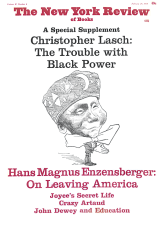In response to:
On Withdrawing from Vietnam: An Exchange from the January 18, 1968 issue
To the Editors:
In her contribution to our exchange on Vietnam [NYR, January 18], Mary McCarthy demonstrates that it is entirely possible to address oneself to solutions of the Vietnam situation without yielding in one’s opposition to the war. She had taken a quite opposite position in “Vietnam: Solutions” [NYR, November 9], which is why I wrote my letter.
Miss McCarthy also makes it clear that the real issue between us is not whether intellectuals should concern themselves with the consequences of American withdrawal, but how these consequences should be assessed. Miss McCarthy is not worried by a Communist takeover in Vietnam. In the first place, she has small regard for the population of South Vietnam which she sees as an unpleasant amalgam of cynical self-seekers, stooges, and phobics (i.e., people who fear Communism). She can also comfort herself that although blood may flow, it will not be all that copious and it will not be red. Anyway, such is the American condition, she is bound to prefer the system governing the lives of Sinyavski and Daniel.
I too am much concerned by the present bad condition of America, but I find Miss McCarthy’s apocalypticism, which leads to her announcement of this preference, mere romancing. If I remember no time when the morale of this country was as low as it is today—and I do not—I ascribe this most immediately to the confusion and impotence we feel because of the inability of our government to give us any cogent honest statement of why we are fighting this war and what the administration foresees as its outcome. If we are fighting to save South Vietnam from Communism, how do we plan to ensure a democratic future for that country? Must we face the possibility of a perpetual reinvolvement? And if it is not the guaranty of freedom for South Vietnam that has brought us into this war but our wish to have a buffer state between China and Southeast Asia, how do we reconcile this with our professed aim of protecting a sovereign state against outside interference? These are only the most obvious of the many pressing questions to which the American people have been vainly waiting an answer. And the fact that we are engaged in this unexplained war at a moment when for the first time in a hundred years the intolerable condition of our Negro population has also been fully forced on our consciousness inevitably demoralizes us.
But if our government has failed to be forthright about its foreign policy or to get down to the strenuous job that has to be done in domestic rights, in the alleviation of poverty, in removing the blight on our cities, I see this as no excuse for intellectuals to match the administration in irresponsibility in the name of a “radical” urgency. It is an insult to intelligence to try to persuade us, as Miss McCarthy undertakes to do, that it is better to have to smuggle your dissidence out of your country, like Sinyavski and Daniel, and be condemned to seven years at hard labor if you are caught at it, than it is to write for The New York Review of Books. What is truly urgent in the present world, and even truly radical, is the demand that we all of us, intellectuals no less than politicians, look at conditions as they actually are, not as we would conjure them up.
One more point and then the discussion, as far as I am concerned, can be considered closed. Miss McCarthy writes: “Mrs. Trilling’s tone suggests that she thinks he [Ho] is Stalin, yet would she reproach US intellectuals, herself included, for having failed to seek an ‘answer’ to save the millions who perished in Stalin’s prisons and slave labor camps?” In the light of my odiously persistent anti-Stalinism which, incidentally, pre-dated the 20th Party Congress by many years, the question is remarkable, but it is followed by another for which it appears to be the preparation: “Like the Bertrand Russell of the epoch, did she conscientiously weigh dropping an atom bomb?” In other words, what Miss McCarthy would seem to be asking is whether the logic of opposition to Stalinism didn’t require that I advocate use of the bomb against the Soviet Union. The question could not be more revelatory. For this surely was Bertrand Russell’s logic, as it now seems to be Miss McCarthy’s. But it is not mine. When America had the atomic bomb and Russia did not I, like everyone else, knew that the bomb could be used to destroy Russian Communism, along of course with all of life in that part of the world. The idea of this as a means of combatting Communism was abhorrent to me and I would not have dreamed of putting it forward. But there were political moves to be made against Stalin, and these existed long before we had the bomb and certainly at Yalta. There were even political uses to which our possession of the bomb could have been put. Neither the American government nor the Western intellectuals tested these political possibilities. They have it in common that they prefer to think in terms of a choice between extremes: acceding to Communism, on the one hand; overt military action, on the other. In his capacity to think only in such extremes, and to swing from one to the other at will, Bertrand Russell is an archetypical figure in this period of history.
Diana Trilling
New York City
This Issue
February 29, 1968



